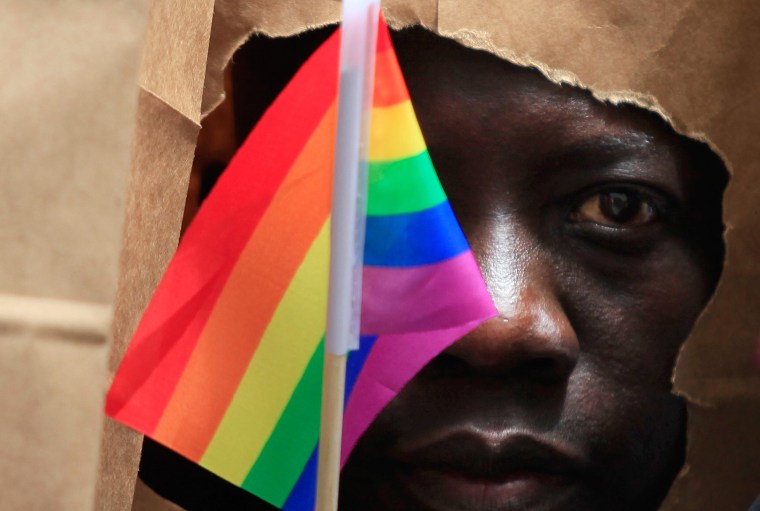Back in New York City in the 1980s, AIDS, death and discrimination defined my life as a young gay lawyer whose partner was dying of AIDS. Same-sex couples were denied an entire slew of basic rights such as the right to hospital visitation, medical decision-making, adoption, and immigration, to name just a few. During that time, it would have literally been impossible for me to imagine the day when the U.S. Supreme Court would deliver the broadest, most historic victory for LGBT equality in our nation’s history. This is a magnificent achievement.
But as tempting as it may be to see this Supreme Court ruling as the end of the struggle for LGBT equality, we cannot.
It is critical that we take the long view and look beyond our own borders to understand that the plight of LGBT people worldwide remains terribly grim, especially in some of the poorest and most repressive countries in the developing world.
According to the International Lesbian, Gay, Bisexual, Transgender, and Intersex Association, in 78 countries around the globe, LGBT people face systematic harsh discrimination and are arrested, imprisoned, or even put to death simply for who they are or whom they love. In Nigeria, for example, federal law classifies same-sex sexual activity as a felony punishable by imprisonment. Several states in Nigeria have also adopted sharia law and imposed the death penalty for gay men. A law signed in January 2015 now makes it illegal for gay people throughout Nigeria to hold meetings or form clubs.
The road to fully realizing the dignity and rights of LGBT people worldwide is long and arduous. But there are immediate steps we can and should take to start making a difference.
President Obama has become an indispensable ally for LGBT communities worldwide over the past several years, and his administration has made unprecedented and encouraging moves to advocate for LGBT rights overseas. Appointing Randy Berry as the first-ever Special Envoy for the Human Rights of LGBT Persons at the State Department is one example of Obama’s pioneering leadership in this regard. But there is more the administration can and should do, and can do without a vote in Congress. Obama must ensure that U.S. tax dollars are not being used to subsidize discrimination abroad, so that people in developing countries are not denied lifesaving services on the basis of their sexual orientation or gender identity.
Too often, LGBT people are falling through the cracks of our foreign aid programs in the absence of firmly established anti-discrimination policies. For example, in March 2014, the U.S. government reviewed its economic and development ties with the Ugandan government after Uganda passed the odious Anti-Homosexuality Bill—a horrific piece of legislation with many harsh and inhumane provisions, including life imprisonment for same-sex sexual behavior. U.S. government officials were shocked to discover that Ugandan organizations receiving U.S. dollars to curb the spread of HIV and AIDS among high-risk populations were also leading Uganda’s national movement to pass the anti-homosexuality bill. As a result, the U.S. government decided to re-allocate its aid dollars to groups that were better suited to address public health concerns affecting the LGBT population.
Last year, Obama signed an executive order against LGBT discrimination that protected the rights of LGBT employees among federal contractors here in the U.S. But the president's directive did not expand those protections to LGBT people employed by and served by contractors and grantees working overseas. Now, 61 Democrats in Congress are calling on Obama to ensure that federal funds will not be used to subsidize LGBT discrimination both in the U.S. and overseas.
RELATED: What’s next for marriage equality’s fiercest opponents?
U.S. foreign aid is critical to ensuring prosperous, healthy societies abroad through its support of healthcare systems, emergency relief, and food aid in the developing world. Denying these services to LGBT people in parts of the developing world where resources are often scarce can be a matter of life or death. Reforming the way that our foreign aid dollars are spent, which the administration could do on its own, would send an important message to foreign governments and would make a real impact on the lives of LGBT people in the developing world.
These are certainly not the only steps we need to take in order to safeguard the inherent dignity of LGBT people in the developing world. But they are concrete measures that demand our attention and action. The U.S. has the resources to influence our global community in powerful ways. And we know that when LGBT people have equal access to jobs, education, healthcare and foreign aid, our whole society is better off.
As we rejoice in the progress for the constitutional rights of LGBT people in the United States, let’s also remember that millions of LGBT people around the world still face immeasurable stigma and discrimination. They are still fighting for their basic human dignity. We urge President Obama to build on his record of clarity and compassion by ending discrimination against LGBT people in overseas contracting and foreign assistance programs without delay.
Robert Bank is the executive vice president of American Jewish World Service.
